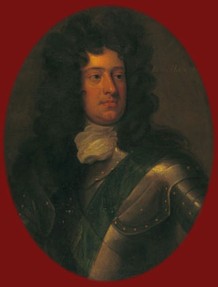 The leader of the anti-Union 'Country Party' was James, 4th Duke of Hamilton. In late September 1705, he waited until most of the Scottish members of parliament had gone home for the day, before he made a startling proposal.
The leader of the anti-Union 'Country Party' was James, 4th Duke of Hamilton. In late September 1705, he waited until most of the Scottish members of parliament had gone home for the day, before he made a startling proposal.
Hamilton opined that there were too many feuds and wrangling amongst the Scottish peers. They should allow their queen to decide who would negotiate the terms of union with England.
Queen Anne - who had only briefly been to Scotland once as a child, spoke just about England at her coronation and referred to Scotland during her reign only in terms of safeguarding the security of England - was thoroughly delighted to be asked to nominate the Scottish committee. She filled it with pro-union peers.
Hamilton had utterly misjudged his monarch's 'neutrality' in Scottish affairs.
With the Union debate thus so heavily loaded to favor English interests, it's hardly surprising that the will of the Scottish people barely penetrated parliament. Yet ensuring that the votes came in with the right answer was an enterprise run like a Mafia operation.
Large sums of money passed hands. A decade before, the disastrous Darien Scheme had left many wealthy Scottish families substantially poorer. Suddenly the Bank of England began paying out 'compensation', but with a blatant political bias. An avowed 'yes' vote made a member of parliament eligible to claim.
John Campbell, 2nd Duke of Argyll was given £20,000 from the English treasury, to pass out as 'payments for arrears of salary' to those peers willing to vote for the union. He kept most of it himself, while also accepting many other 'lavish (material) rewards'. In addition, Argyll managed to wrangle two English peerages (Baron Chatham and Earl of Greenwich) for himself, and a Scottish peerage (Lord of Islay) for his younger brother.
Other members of the Scottish Parliament were also able to trade their acquiescence for personal gain and promotions at the court of their queen.
Right up until the eve of the vote, the Duke of Hamilton remained outspoken in his opposition to the union. But on the day, he didn't turn up, citing toothache.
In the aftermath, his cripplingly high debts mysteriously disappeared into the ether. He was also suddenly awarded two English peerages - Duke of Brandon (with estates in Suffolk) and Baron Dutton of Cheshire. Queen Anne knighted him in the Order of the Garter, and the new British Parliament made him ambassador to Paris.
Meanwhile, the Duke of Queensberry - who was credited by the monarch as orchestrating the whole union, with his ability to find the pressure points of peers, and press - was made Duke of Dover. He was awarded £3,000 a year, for the rest of his life, paid for by the English Post Office.
It wasn't all bribery and corruption of the monetary sense though. Some inducements played for hearts and minds.
Presbyterian Kirks fell silent in their opposition after the Act of the Security of the Church in Scotland was placed before the house. Safe-guarded from post-union religious interference, the clergy stopped issuing sermons against it.
On January 16th 1707, the Scottish Parliament ratified the Union with England Act by a majority of just forty-three. It was formally dissolved on April 28th, ahead of the signing of the Act of Union on May 1st 1707.


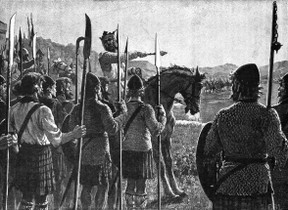 For much of both countries' history, there have been repeated attempts to unite Scotland and England under a common leader.
For much of both countries' history, there have been repeated attempts to unite Scotland and England under a common leader.

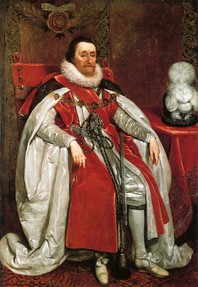 Much of the previous century had been marked by turmoil and war, concerning the crowned heads of England and Scotland. Particularly since those monarchs were one and the same.
Much of the previous century had been marked by turmoil and war, concerning the crowned heads of England and Scotland. Particularly since those monarchs were one and the same.





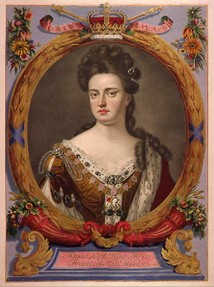 In 1701, the English Parliament had unilaterally passed an Act of Settlement, awarding itself the right to choose any future king or queen of Scotland.
In 1701, the English Parliament had unilaterally passed an Act of Settlement, awarding itself the right to choose any future king or queen of Scotland.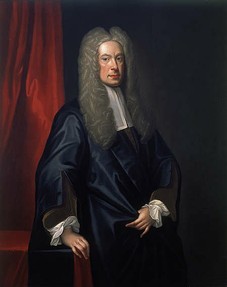 Sir John Clerk of Pennycuik (pictured right) was one of the leading lights of Scotland's union with England. As a commissioner for the Union of the Parliaments, the Scottish MP helped negotiate the terms of the treaty; and he was amply rewarded for his efforts.
Sir John Clerk of Pennycuik (pictured right) was one of the leading lights of Scotland's union with England. As a commissioner for the Union of the Parliaments, the Scottish MP helped negotiate the terms of the treaty; and he was amply rewarded for his efforts.


 The leader of the anti-Union 'Country Party' was James, 4th Duke of Hamilton. In late September 1705, he waited until most of the Scottish members of parliament had gone home for the day, before he made a startling proposal.
The leader of the anti-Union 'Country Party' was James, 4th Duke of Hamilton. In late September 1705, he waited until most of the Scottish members of parliament had gone home for the day, before he made a startling proposal.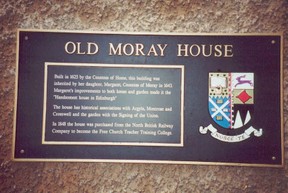 On May Day 1707, the streets of Edinburgh were practically impassable. Crowds surged and desperate parties searched high and low for the place where the Act of Union would be signed.
On May Day 1707, the streets of Edinburgh were practically impassable. Crowds surged and desperate parties searched high and low for the place where the Act of Union would be signed.




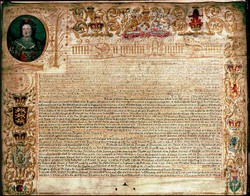

 St Tydecho's Churches in West Waleson 09/03/2014
St Tydecho's Churches in West Waleson 09/03/2014
 Goodies for an Outlander Premiere Partyon 03/06/2015
Goodies for an Outlander Premiere Partyon 03/06/2015
 Holocaust Memorial Day Interview with Rainer Höss, Grandson of Rudolf Architect of Auschwitzon 01/24/2015
Holocaust Memorial Day Interview with Rainer Höss, Grandson of Rudolf Architect of Auschwitzon 01/24/2015
 Romantic Valentine Gifts for an Outlander Fanon 01/16/2015
Romantic Valentine Gifts for an Outlander Fanon 01/16/2015

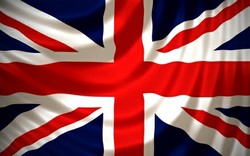
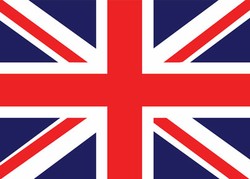
Comments
Things have changed, Scotland has always been on the cusp but now the mood and politics are changing. A tory landscape does not impress those living in Scotland and being dragged out of the EU is just the icing on the cake.
I believe that there are not distinct nations, but there is one human race that is governed at various levels according to cultural and geographical facts. Thus at one level Scotland is a cultural entity, and therefore should have a Sottish government, but at another Britain is a geographical reality that must have a British government, and above these come Europe, and there should be governments at each level.
Gavin Alexander is correct on Defoe who was a spy for the English Parliament as the quote from him makes quite clear. He said himself that had it been known, he would have been torn limb from limb by the angry Scottish mobs.
I think there's an error in there re Daniel Defoe: he was an active unionist and paid to act as a spy for the English Government, not the Scottish Parliament, as stated in the text.
Obviously when I said that we are all British I did not mean any offence to people from Ireland,who are not British,but readers of these pages will know that I am a true friend of Ireland.
You ought not focus just on one act of treachery, for the upper classes of England and Scotland have their hands steeped in blood and have a record of disrespect for the lower orders and other races. Go through history and reflect on massacres committed by both English and Scots, on each other and sometimes their own people. The massacre of the McDonalds of Eigg was committed by Scots with not an Englishman in sight, to give one example, and the massacre of Glencoe had little if any English involvement. Yet the appalling behaviour of English troops in Scotland in Plantagenet and Tudor times were atrocities of which no Englishman should be proud.Yet Henry the Eighth massacred not only Scots at the rough wooing, but he also slaughtered English Catholics after the pilgrimage of grace. I know that you Scots lament Flodden, but no Englishman celebrates it. What is there to celebrate in bloodshed? Nothing. Both English and Scots shared in the evils of the slave trade, and both nations sent troops who did evil deeds in Ireland.
The burden of my comment is that the two nations should work together to forge a common future in a spirit of friendship and respect. As an Englishman, David, I respect the Scots' need for self-governance, but I want it to be in a strong political union with an England friendly to Scotland and its other neighbours.
I speak as an Englishman who is half Irish, and it is my ability to accept a multiple identity rather than to exclusively define myself as only English that gives me hope that the future of these islands will be when we can all accept that we are all British. We should respect each other's heroes. I respect William Wallace as a great hero, even though he would have been no friend of mine.
Excellent. Thank you. This treachery now in the process of being reversed.
Scotland's Act of Union with England served as a stark reminder that a nation's fortunes are rarely with its people, but with those sitting at the top of the pile-of course this only applies to the past,because nowadays our leaders are super honest and listen to what the proletariat want. Really bad article with no references only opinions.
History is written by the winner. Scotland's being subject to this. Far from being a small insignificant country at the edge of Europe, Scotland punched way above her weigh in the political sphere. That was erased from history after the union. Until 1603 England's claim to fame was it was populated by pirates & cutthroats! She had been at war with France for most part of the previous 300 years. The Stuart dynasty under James VI stopped this & peace with all its fiscal benefits began to flood into England!
That mingling would be fine by me too, if it didn't lead to one dominant party imposing its will upon another. If we could all share our gifts and our heritage, rather than English and England promoted at the expense of all things blatantly Celtic.
I say 'blatantly', because the entire Isles contains that Celtic undercurrent.
Yes, the Culloden thing didn't make me happy either. Some blarb about it: http://www.bubblews.com/news/2486310-...